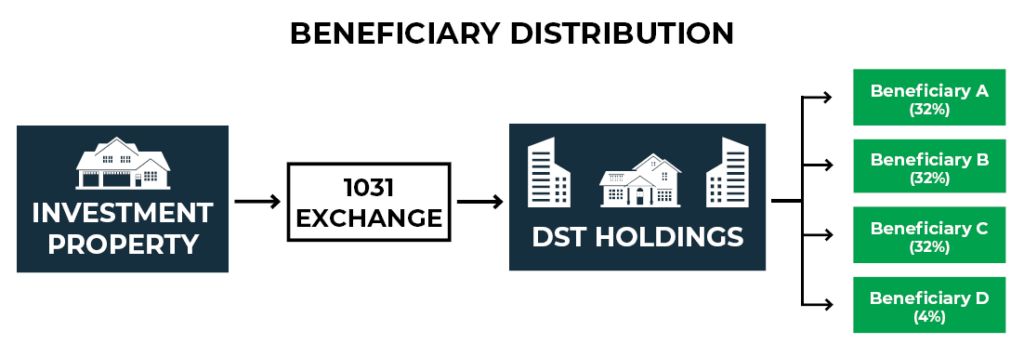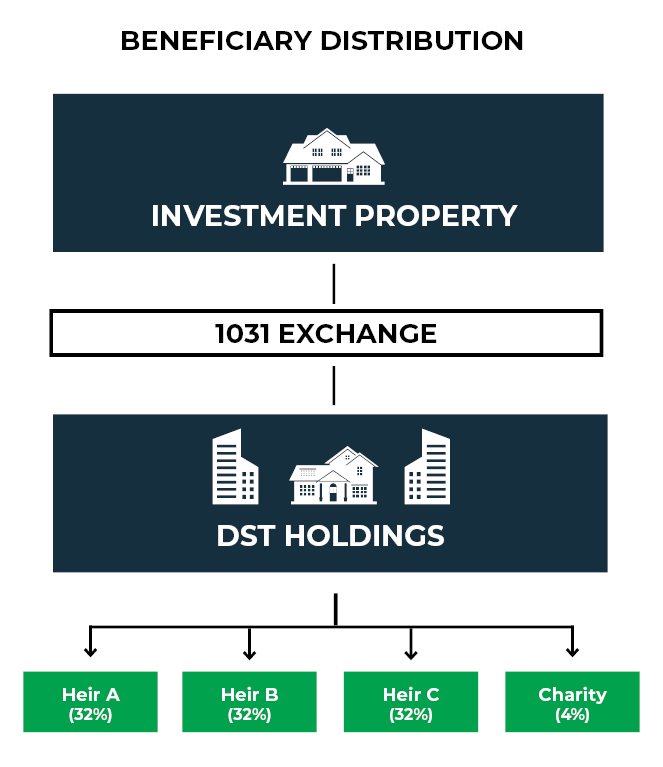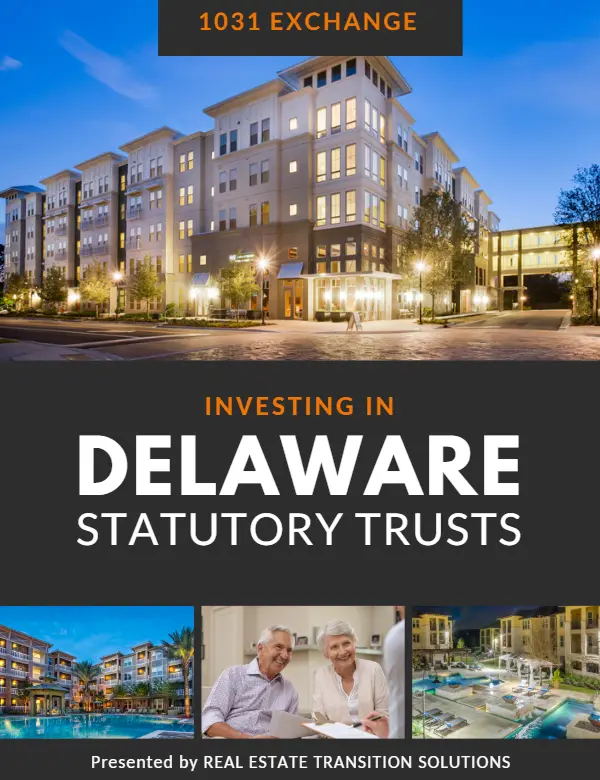7 Estate Planning Benefits of
Delaware Statutory Trusts (DSTs)
DSTs provide owners and their beneficiaries with distinct benefits over traditional fee simple investment properties, including higher income potential, superior tax savings, and streamlined distributions. The end result? Peace of mind in your estate planning journey.
Estate planning can be a complex and challenging endeavor, particularly for traditional investment real estate owners looking to seamlessly distribute assets to multiple beneficiaries. A compelling alternative that is increasingly favored by 1031 Exchange investors is the use of Delaware Statutory Trusts (DSTs). DSTs provide access to institutional-grade real estate investments, often with greater passive income potential. Simultaneously, DSTs streamline the estate planning process, reduce tax liabilities, and accelerate generational wealth building.
What is a Delaware Statutory Trust (DST)?
At its core, a DST is a legal entity that enables investors to pool their resources, leveraging fractional ownership to access institutional-grade commercial real estate properties that might otherwise be out of reach. By enabling investors to acquire fractional ownership in large, income-generating properties, a DST allows them to benefit from potential returns and tax advantages without the management responsibilities and high capital expenditures often associated with direct fee simple real estate ownership.
How Delaware Statutory Trusts (DSTs) Work
Delaware Statutory Trusts (DSTs) simplify the real estate investment process. An institutional real estate company referred to as a assumes the responsibilities of identifying, acquiring, and managing properties, which are then held within the trust. Investors can acquire a beneficial interest in these trusts, granting them a pro rata share in the property’s potential income and eventual sales proceeds without engaging in day-to-day management.
Importantly, following the release of IRS Revenue Ruling 2004-86, DSTs are considered by the IRS to be 1031 Exchange eligible as “like-kind property” allowing 1031 Exchange investors to have full tax deferral when investing both in and out of DST property.
The DST Sponsor ensures the trusts are compliant with securities regulations and makes them available to broker-dealers to fund the available equity. The structure of DSTs facilitates a seamless and passive 1031 Exchange eligible investment, making them an attractive option for investors seeking to diversify their portfolios while also planning for efficient wealth transfer to their beneficiaries.
DST Property Types
DSTs can include a wide variety of property types, catering to diverse investment preferences. While a DST may own a single property or a portfolio of property, each individual DST typically owns a single property type. The property types commonly found in DSTs include multifamily apartment buildings, industrial warehouses, medical office, self-storage facilities, senior housing properties, student housing, hospitality properties, net lease retail and occasionally commercial office properties. Many investors elect to acquire multiple DSTs, thereby creating a blended portfolio of different property types to address the investors’ specific objectives.







Advantages of 1031 DST Investment Properties
Capital Gains Tax Savings
DSTs qualify as a like-kind property with a 1031 Exchange. This allows real estate investors to defer paying capital gains taxes on the sale of an investment property, often resulting in significant savings. In some states, capital gains taxes can be as high as 42.1%, including federal capital gains tax, state capital gains tax, depreciation recapture tax and net investment income tax.
Greater Income Potential
Typically, DST properties are structured with an emphasis on cash flow. By acquiring high-quality institutional property in cities with strong projected growth, DSTs can focus on seeking to preserve investment value and greater income potential for investors. The monthly income varies from trust to trust depending on the property type and investment thesis, but often, independent investors may be able to generate more monthly income through the ownership of a DST property than through direct property ownership.
Institutional-Grade Properties
Although a DST can own nearly any real estate asset of any quality, the underlying real estate held by DSTs tends to be high-grade institutional property. “Institutional grade” generally refers to a property of sufficient size and stature to merit attention from large national or international investors, and typically have the characteristic of high quality assets in major markets and at price points beyond the reach of individual investors and smaller partnerships.
Due to the rigid criteria established by the IRS for a DST to qualify as an exchange property, lower-quality assets are rarely eligible. As a result, DSTs often own high-quality assets with credit-worthy Fortune 1000 companies as tenants. If not for the DST structure, these properties would otherwise be unattainable for an independent investor to purchase via a 1031 Exchange.
Access to Favorable Markets
Investors can effortlessly exchange into preferred real estate markets and favorable property types, optimizing their portfolio value.
Passive Property Management
DSTs are passive investments. As such, individual investors have no participation in the daily management or operations of the DST real estate. Once you select a DST investment and acquire your ownership, your work is done. Through a 1031 Exchange, investors can exit a management-intensive asset and shed landlord responsibilities without foregoing the benefits of owing investment real estate. This is a particularly attractive benefit for independent investors with major life changes ahead—for example, those entering retirement, growing a family or planning for an estate transfer.
Risk Diversification
DSTs have a comparatively low minimum investment requirement, usually $100,000, making it easy to diversify across multiple assets to help mitigate risk. Under the IRS’s property identification rules for 1031 Exchanges, investors can reinvest the proceeds from an investment property sale into multiple DSTs, creating immediate investment diversification among different DST property types and locations.
Tax Savings for Estate Beneficiaries
DSTs also offer estate planning benefits. Through a step-up in basis, beneficiaries can defer capital gains, depreciation recapture and net investment income tax upon the death of an owner. The estate can also divide a DST investment seamlessly among beneficiaries, something that is generally challenging for traditional, directly-owned fee simple real estate assets.
As an illiquid investment with fractional ownership, a CPA is able to discount a DST investment when calculating the value of the total estate. It is not uncommon to see discounts ranging from 20% to 30%, which can serve to reduce potential estate taxes.
Low Risk of Exchange Failure
DST exchanges rarely fail because the real estate has already been vetted and acquired by the DST sponsor. Using a prominent 1031 Exchange Advisor helps reduce the probability of a failed exchange. Real Estate Transition Solutions thoroughly vets all DST sponsors and DST properties. We believe a quality-control process and higher-grade investment opportunities help lower risk of a failed 1031 Exchange.
Ability to Close in 3 to 5 Days
Given the DST Sponsor has already acquired the properties within a Delaware Statutory Trust, investors can purchase the beneficial interests in the trust quickly compared to many other replacement property options. This is ideal for a time-sensitive 1031 Exchange or for those investors who value continuity in their income as DST investors can typically close within 3 to 5 business days following the sale of their relinquished property.
Low Minimum Investment
The minimum investment for a 1031 DST is typically $100,000 – significantly lower than the costs of purchasing commercial property outright.
Disadvantages of 1031 DST Properties
A lack of management control can be both an advantage and disadvantage. After all, the passive nature of a DST is one of the characteristics that make this such an attractive investment option. The DST Sponsor puts in place a highly experienced team of real estate professional to manage DST operations. However, some investors prefer to participate in the property strategy and operations. For those investors, the DST structure would not be a good fit.
As with any type of income-oriented real estate investment, investors may be subject to future vacancy rates and interest rate fluctuations, which could reduce cash flow potential and price appreciation. DSTs are also susceptible to changes in the IRS’s treatment of tax-deferred exchanges.
Common Estate Planning Challenges with Investment Property

Estate planning for investment real estate owners can present a complex set of challenges. Investors must navigate ever changing tax considerations, including capital gains and estate taxes, while also ensuring the desired distribution among beneficiaries. The complexities intensify when dealing with inherited properties that may come with their own set of loan obligations, maintenance costs, and potential co-ownership disputes. Additionally, market volatility can significantly impact the overall value of the estate, and a lack of diversification in the property portfolio can exacerbate these risks. Delaware Statutory Trusts can be a valuable tool to address these challenges.
7 Estate Planning Benefits of DST Properties
Eliminate Tax Burden for Beneficiaries with a Step-up in Basis
Perhaps one of the most significant advantages of utilizing DSTs in estate planning is the ability to eliminate capital gains tax on inherited property. According to IRS Section 1014(a)(1), beneficiaries inherit assets with a stepped-up basis, meaning that an asset’s tax basis is readjusted to its fair market value at the time of the decedent’s death. As a result, the accrued capital gains, which may have been accumulated over decades, become virtually tax-free for the beneficiaries. The strategy of deferring taxes through 1031 Exchanges until the passing of an owner, which creates a step-up in basis, is a core aspect of many intentional real estate owners’ tax planning.
Step-up in basis example:
- Owner purchases property with an original cost basis of $500,000
- Property appreciates to $1.5 million in value by the time of owner’s passing
- Property is inherited with a stepped-up basis of $1.5 million – the current market value
- Beneficiary can sell the property at current value with no capital gains tax owed
Streamline Distribution to Multiple Beneficiaries
One of the common hurdles in estate planning is navigating the potential disagreements among beneficiaries, particularly regarding asset management, liquidation, and the distribution of assets. For illiquid assets such as real estate investments, the division becomes even more complicated and prone to disputes.
DSTs offer a solution to these challenges. Instead of leaving assets in a form of ownership that could lead to contention among beneficiaries, investors can leverage DSTs to ensure a proactive diversification and distribution strategy. DSTs are a co-ownership structure, however there is no management responsibility associated with ownership. Ownership can easily be divided and distributed to beneficiaries however the owner intends without forcing a co-management situation. By exchanging fee simple real estate into DSTs, investors can ensure a flexible and efficient division of assets among beneficiaries.
Streamline Distributions to Non-Profit Organizations
A common goal for many investment real estate owners to make a lasting impact through charitable giving. While the intention is noble, the complexity of donating illiquid actively managed assets, such as directly owned real estate, poses a significant challenge. Many non-profit organizations are simply not equipped to handle direct real estate bequests. Often the organizations are forced to engage outside specialists to evaluate whether accepting of the gift exposes them to liability such as undisclosed environmental or title issues. Once accepted, the properties are commonly sold shortly after receipt, often at a discount to what a more experienced investment real estate owner could realize.
DSTs provide a solution that empowers non-profits and charitable organizations to benefit from a consistent income stream without the need for costly vetting and the challenges of direct real estate ownership. This allows the organization to focus on its core mission without being sidetracked by the intricacies of real estate, such as property management, insurance, and other related issues. Utilizing DSTs can be a win-win solution: it simplifies the gifting process for the investor and recipients. DSTs also allow for a portion of ownership to be gifted as opposed to a property in its entirety.
Accelerate Wealth Accumulation and Enhance Income Potential
DSTs can significantly accelerate the wealth accumulation process while simultaneously stabilizing cash flow for investment real estate owners and their beneficiaries. By utilizing 1031 Exchanges, investors can strategically defer taxes, allowing the proceeds from property sales to remain invested and fuel compounded growth. This not only expedites the wealth building process but also maximizes monthly income by ensuring more capital is actively invested.
The flexibility of DSTs also allows investors to diversify beyond traditional real estate investments such as small-to-medium size apartment buildings and single-family homes, providing access to a range of property types, including commercial properties such as industrial or medical office and niche property types such as self-storage facilities. This strategy can lead to robust wealth accumulation and enhanced income potential, providing investors and their beneficiaries a substantial advantage over traditional fee simple ownership.
Federal and State Estate Tax Exemptions
When an individual passes away, estate taxes are imposed at both federal and state levels on the net value of an estate. Currently, the federal government has a relatively high exemption threshold; only estates surpassing this value are subject to federal estate taxes. However, many states impose estate taxes with significantly lower exemption thresholds, subjecting a far greater number of estates to taxation.
One of the prominent advantages of using a DST in estate planning is the ability to potentially reduce the taxable estate value through two types of discounts:
- Discounts for Lack of Control: Since DST investors do not have direct control over the property or the trust’s decisions, a discount can be applied to the asset’s value for estate valuation purposes. The reduced value is purely for estate valuation purposes and should not be interpreted to mean a true reduction in the asset values from a sale standpoint.
- Discounts for Lack of Marketability: DST interests are not as easily marketable as publicly traded assets. The absence of a readily available market for these interests can further reduce their value for estate tax calculations.
By strategically utilizing DST investments and leveraging these discounts, investment real estate owners can potentially reduce their estate’s taxable value. Additionally, many states only include real property physically located within the state of residence of the owner in the calculation of their estate value subject to potential state-level estate tax. Acquiring DST real estate outside an owner’s state of residence is another way to mitigate state-level estate tax. These strategies not only ensure more assets are passed down to beneficiaries but can also result in significant tax savings, especially in states with stricter estate tax regulations.
Access to Equity & Continuous Cash Flow
The strategic combination of DSTs with an Umbrella Partnership Real Estate Investment Trust (UpREIT) offers beneficiaries an innovative avenue for enhanced liquidity. By leveraging a 721 exchange, DST ownership can be converted into Operating Partnership (OP) units within a Real Estate Investment Trust (REIT).
Post-conversion, these OP units (which are essentially shares in the REIT with embedded tax deferral inside the shares) can potentially be traded on secondary markets, contingent on the specific terms outlined by the REIT. The liquidity provisions for the OP units potentially grants beneficiaries a method to benefit from the aforementioned step-up in basis and expedite the sale of their inherited real estate holdings to create a liquidity event.
Distribute Co-Owned Assets with Flexibility
Estate planning becomes even more complex when co-owned assets are involved. A common challenge arises when co-owners of properties have different preferences for distributions: some may wish to cash out, while others prefer reinvesting to defer capital gains taxes, and each will receive step-ups in basis at different times. DSTs address this by facilitating strategies such as the “1031 drop and swap”, where the ownership entity such as an LLC or Limited Partnership is dissolved and the respective members or partners take their ownership directly in their own names or entities such as revocable family living trusts before a sale and 1031 Exchange.
Some entities cannot perform a drop and swap due to the timing of the sale, the position of the taxing authority in which either the property or owners are located or the need for lender consent. In these situations, a “swap and drop” may be an effective solution. In this scenario a property is sold, and each co-owner selects their own DST properties to exchange into, all of which the co-ownership entity acquires. Following the exchange, the entity is dissolved and distributes the specific DST properties the co-owners selected to be owned outright by those individuals.
The exact mechanics and most appropriate strategy depend on specific circumstances. It is crucial to consult with a licensed 1031 Exchange Advisor to determine whether a “swap and drop” or “drop and swap” is most appropriate for your situation.
Estate Planning Example with DST Property

Estate Owner Background
Meet Sarah, a seasoned investment real estate owner based in California, who skillfully utilized a 1031 exchange to optimize the sale of her 6-unit apartment building. Sarah’s primary objectives included (1) tax deferral, (2) improving monthly income potential, (3) eliminating active property management, and (4) simplifying the estate planning process for her beneficiaries, including her spouse John, children Emily and Mark, and an important charity she supported.
Sarah successfully sold her apartment building for $3 million and deferred $816,200 of tax liability associated with capital gains, depreciation recapture, and NIIT. She strategically reinvested the net proceeds into a diversified portfolio of DST properties, paving the way for consistent monthly passive income and the elimination of capital gains tax on inherited assets.
-
Net Sales Proceeds $2,800,000
-
Original Tax Basis $600,000
-
Estimated Taxable Gain $2,200,000
-
Estimated Tax Liability $816,200
Estate Owner’s DST Portfolio and Beneficiaries
Through a strategic 1031 Exchange into DST real estate, Sarah effectively achieved her investment and estate planning objectives while enjoying full tax deferral when selling her investment property. In her diversified portfolio and via her revokable family living trust, she allocated 32% of the portfolio to each of her three family members and designated 4% of the portfolio to be gifted to her chosen charity as a beneficiary.
The well-balanced mix of industrial and multifamily DST properties diversified across three states generated an annual cash flow of $142,300, equivalent to a solid 5.08% cash-on-cash return. Sarah’s investment plan not only secured her financial future but also ensured her legacy would align with her values and priorities.
| DST Holdings | Equity | % | Beneficiary |
|---|---|---|---|
| Bluerock Industrial DST | $900,000 | 32% | John |
| Passco Multifamily DST | $900,000 | 32% | Emily |
| JLL Industrial DST | $900,000 | 32% | Mark |
| Starboard Multifamily DST | $100,000 | 4% | Charity |
| Total DST Equity | $2,800,000 | 100% |
Upon Sarah’s passing, her spouse John, and children Emily and Mark will inherit these DST properties with a step-up in basis. This means the properties’ tax basis will be readjusted to their fair market value at the time of Sarah’s death, effecting eliminating any capital gains that may have accumulated during Sarah’s ownership.
- John (Spouse): Chooses to keep the inherited DST for its consistent cash flow, valuing the financial stability it provides.
- Emily: Chooses to sell her inherited DST outright, taking advantage of the step-up in basis to cash out without incurring capital gains tax.
- Mark: Elects to roll his DST into another real estate investment, taking advantage of another 1031 Exchange for a more hands-on investment property.
- Charity: Keeps the DST, using the consistent cash flow for its charitable activities.
By using a 1031 Exchange, Sarah not only defers a significant tax liability but also ensures that her spouse John, children, and the charity can make the most out of their inheritance, either by keeping the DST properties for consistent income, leveraging further 1031 Exchanges, cashing out with minimal tax implications, or using the funds for charitable activities.


FAQs About Estate Planning with DSTs
Why does the government allow for a step-up in basis?
Can DSTs be owned in a revocable or irrevocable trust?
What disqualifies a property from being used in a 1031 Exchange?
How long should heirs hold onto their 1031 Exchange properties?
Speak with a Licensed 1031 Exchange Advisor
If you’re an investment real estate owner with questions about estate planning, DSTs, or executing a 1031 Exchange, contact Real Estate Transition Solutions to schedule a complimentary consultation with one of our licensed 1031 Exchange Advisors. Our free consultations can be done over the phone, via web meeting, or in person at our offices located in Seattle, WA and throughout the West Coast. To schedule your free consultation, call 888-409-5097, email info@re-transition.com, or book directly with an Advisor online.
About Real Estate Transition Solutions
Real Estate Transition Solutions (RETS) is a consulting firm specializing in tax-deferred 1031 Exchange strategies and Delaware Statutory Trust investment property. For over 26 years, we have helped investment property owners perform successful 1031 Exchanges by developing and implementing well-planned, tax-efficient transition plans carefully designed to meet their objectives. Our team of licensed 1031 Exchange Advisors will guide you through the entire process, including help selecting and acquiring passive management replacement properties best suited to meet your objectives. To learn more about 1031 Exchanges and Real Estate Transition Solutions, visit re-transition.com or call us at 888-755-8595.


